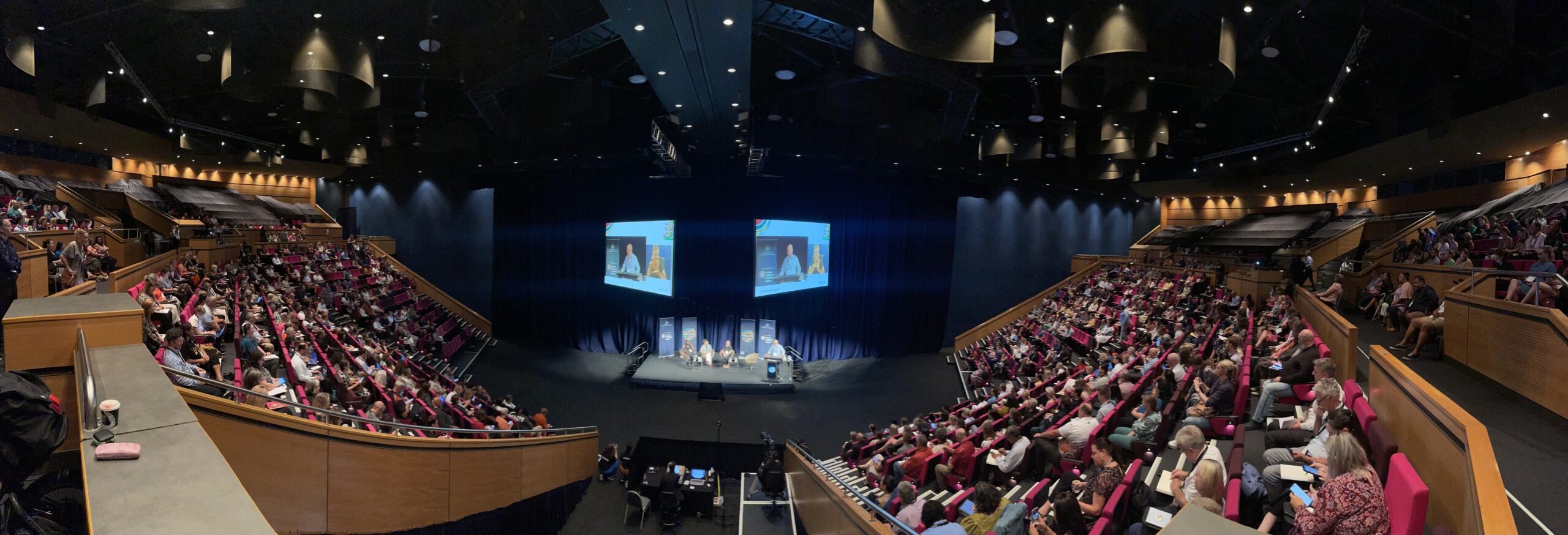Respecting culture and having the hard conversations to build real partnerships with First Nations
28 June 2023
● News and media
Governments need to respect First Nations culture and focus on building trust and creating spaces for the hard conversations needed to create change, according to speakers at ANZSOG’s First Peoples to All Peoples Conference.
The call came in a plenary session with Fiona Cornforth, CEO of the Healing Foundation and Dr Chris Sarra, Director-General of the Department of Seniors, Disability Services and Aboriginal and Torres Strait Islander Partnerships on the theme of Formal Partnerships and Shared Decision-Making (Priority Reform 1) How can governments share decision-making with First Nations in genuine partnership?
It is one of 24 videos that ANZSOG has now made freely available on our website, covering the opening addresses, key panel sessions, plenaries and yarning sessions, as a resource for public servants and others interested in First Nations policy, particularly the National Agreement on Closing the Gap and its four Priority Reforms in Australia and the reforms outlined in the New Zealand Public Service Act 2020.
Both speakers stressed the importance of building and strengthening structures that empowered First Nations to genuinely share decision-making authority with governments to make progress on the Closing the Gap targets.
Ms Cornforth noted that governments need to engage with First Nations peoples to build trusting relationships, so conversations about solutions can occur.
“The way governments’ systems are set up don’t lend themselves for having conversations for relationship. There must be space for those conversations to happen before there are conversations for possibility and then conversations for mutual benefit, for agreement, for solution making and designing a program, policy or legislation.
“We need to think about how we create that space to envision together where we [wish to] end up and then work back from that using ways we know may work,” she said.
Dr Sarra said that governments needed to have the courage to have the hard conversations necessary for change.
“Governments cannot pick the people it’s easier to talk with. We have to get on the ground and have the hard conversations – as difficult as they are.
“Yes, we’ve got some struggles, we’ve got some challenges, but that is not the totality of who we are. We are exceptional people! Governments should embrace that gift and appreciate our agility in being able to survive on this land for tens of thousands of years”.
Ms Cornforth said that she had been appointed to the National Aboriginal and Torres Strait Islander Women and Children’s Safety Advisory Council and had therefore been part of a group that could talk about the big picture and the context for the issues that are occurring.
“We’re able to give the narrative that goes along with the data. We’ve been supported with resources – a secretariat. We developed a change creation model, an overarching document that everybody needs to know about before they can even consider what their role might be in that action plan. We are seen and heard; we are respected for the knowledge we bring to the table.”
Dr Sarra spoke about building on the strengths of First Nations peoples, respecting their cultures and acknowledging they know their own circumstances best.
“We are doing some really cool work in the Queensland Government about understanding and honouring our ancestors and the challenges. That’s at the core of what we do. In order for us in government to share decision-making in a way that’s authentic, we have to own our past, acknowledge it and embrace the humanity of the First Australians.
“I’m not persuaded that here in Australia we’ve embraced the First Australians with the love that is required. I think we are getting there in terms of understanding that there is a good reason to embrace with a sense of love First Australians and First Queenslanders and that is because if we can do that, our roots run deeper. If governments can embrace, acknowledge and honour our capacity, we’ll all be better for it. As Black fullers, we carry a gift – we carry the blood of the oldest human civilisation on the planet.
Both speakers shared their personal and professional experiences and emphasised the importance of strong, genuine partnerships between governments and First Nations peoples. They then participated in concurrent yarning sessions elaborating on their earlier messages and answering questions from delegates.
The First Peoples to All Peoples Conference in Meanjin Brisbane in March brought together over 800 in-person attendees (plus 300 online), for three days of listening to First Nations speakers and hearing stories of success.
These video recordings will be a permanent record of the rich debates and discussions held during the event, and a great resource for anyone interested in First Nations policy, particularly the National Agreement on Closing the Gap and its four Priority Reforms in Australia and the reforms outlined in the New Zealand Public Service Act 2020.
Speakers featured include:
- Australian and Aotearoa New Zealand ministers for Indigenous affairs, Linda Burney and Kelvin Davis
- National Indigenous Australians Agency CEO Jody Broun
- Productivity Commission Commissioner Romlie Mokak
- National Iwi Leaders Group, Lead Data Technician Kirikowhai Mikaere
- National Aboriginal Community-Controlled Health Organisations CEO Donnella Mills
- Lowitja Institute CEO Janine Mohamed
- Queensland Department of Aboriginal and Torres Strait Islander Partnerships CEO Chris Sarra
- National Iwi Leaders Group Co-chair Rahui Papa
They discuss challenges and successes related to the four priority reforms: formal partnerships and shared decision-making; building the community-controlled sector; transforming government organisations, and shared access to information and data.
